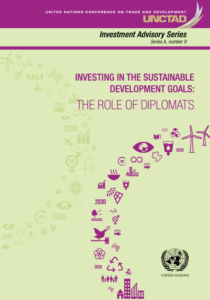Investing in the Sustainable Development Goals: The Role of Diplomats
This handbook is one of the tools developed by UNCTAD to help governments in promoting private investment in sustainable development. It is part of a series of programmes and tools designed in response to the UNCTAD 2014 Investment Action Plan, and incorporates the recommendations of the UNCTAD Investment Policy Framework for Sustainable Development. The handbook builds on an earlier guide for IPA officials and policy makers on Promoting Investment in the Sustainable Development Goals.
Key messages in this handbook:
- The financing needed to advance the SDGs requires special actions and programmes by government institutions to mobilize private sector investments, including efforts by ministries of foreign affairs and their diplomatic services.
- In strategic locations selected for the targeting of foreign investors, including SDG investors, investment promotion should be integrated in the organizational set-up of the diplomatic missions.
- Diplomats and commercial attachés should be aware of national SDG investment objectives, targets and specific projects they need to promote, as well as the stages of the investment cycle in which they can intervene.
- The COVID-19 crisis will have longer-term consequences in the way in which IPAs operate in the future. Most likely, overseas travel by IPA staff will be reduced and various marketing and outreach activities will be done online. The role of diplomats as country representatives for potential investors to meet will therefore become more significant.
- Training of diplomats before their deployment overseas on the actors, methods and tools for the promotion of investment is critical, and special attention should be given to the specific aspects of SDG-related investments.
- For IPAs and diplomatic services, the promotion and facilitation of SDG-related projects not only requires interactions with private sector investors, but also collaboration and partnerships with many other stakeholders, such as outward investment agencies, non-governmental organizations (NGOs), academia, institutional investors, asset management firms and diaspora groups. Diplomats are also in contact with their counterparts from across the globe, and may relay information back home about SDG projects that other countries promote. This can be of particular relevance to OIAs in their own countries.
- Standardized practices – such as Individual Action Plans for Diplomats and Stakeholder Account Plans at embassies – are key tools for effective coordination with stakeholders and the continuity of investor services by diplomatic missions.
















